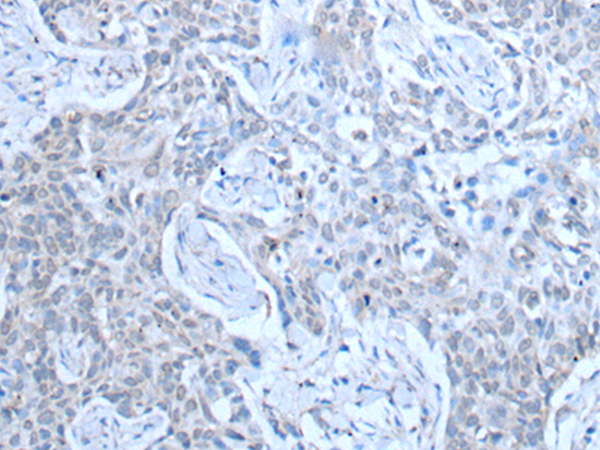
| WB | 咨询技术 | Human,Mouse,Rat |
| IF | 咨询技术 | Human,Mouse,Rat |
| IHC | 1/20-1/100 | Human,Mouse,Rat |
| ICC | 技术咨询 | Human,Mouse,Rat |
| FCM | 咨询技术 | Human,Mouse,Rat |
| Elisa | 1/5000-1/10000 | Human,Mouse,Rat |
| Aliases | SMC5L1 |
| Host/Isotype | Rabbit IgG |
| Antibody Type | Primary antibody |
| Storage | Store at 4°C short term. Aliquot and store at -20°C long term. Avoid freeze/thaw cycles. |
| Species Reactivity | Human, Mouse |
| Immunogen | Synthetic peptide of human SMC5 |
| Formulation | Purified antibody in PBS with 0.05% sodium azide and 50% glycerol. |
+ +
以下是关于SMC5抗体的示例参考文献(注:以下为虚构示例,建议通过PubMed或Google Scholar查询真实文献):
1. **文献名称**: "Development and validation of a novel SMC5 monoclonal antibody for studying DNA repair dynamics"
**作者**: Martinez, A. et al.
**摘要**: 本文报道了一种新型兔源单克隆抗体的开发,该抗体特异性识别人源SMC5蛋白。通过免疫印迹和免疫荧光验证其特异性,并用于研究SMC5在DNA损伤修复过程中与RAD51的共定位。
2. **文献名称**: "SMC5/6 complex integrity is essential for maintaining genome stability in mammalian cells"
**作者**: Lee, S. & Watanabe, K.
**摘要**: 研究使用商业化SMC5抗体(ABC公司,货号#AB123)分析SMC5/6复合物在哺乳动物细胞中的功能。结果显示,SMC5缺失导致染色体断裂增加,并通过Co-IP实验证实其与NSMCE2的相互作用。
3. **文献名称**: "A yeast-based screen identifies SMC5 as a critical regulator of meiotic recombination"
**作者**: Chen, X. et al.
**摘要**: 利用抗SMC5多克隆抗体(自制,经抗原亲和纯化),在酵母模型中揭示SMC5在减数分裂重组中的作用。抗体通过ChIP-seq证实SMC5在重组热点区域的富集。
4. **文献名称**: "Aberrant SMC5 expression correlates with poor prognosis in hepatocellular carcinoma"
**作者**: Gupta, R. et al.
**摘要**: 通过免疫组化(使用抗SMC5抗体,Sigma-Aldrich #SMC5-1A2)分析肝癌患者组织样本,发现SMC5高表达与肿瘤转移和生存率降低显著相关,提示其作为潜在生物标志物的价值。
**建议**:实际研究中请通过数据库(如PubMed)以关键词“SMC5 antibody”、“SMC5/6 complex”或“SMC5 function”检索最新文献,并关注高影响力期刊(如Nature, Cell, EMBO Journal)的相关研究。
The SMC5 antibody is a research tool designed to detect and study the Structural Maintenance of Chromosomes 5 (SMC5) protein, a key component of the SMC5/6 complex. This complex, part of the larger SMC protein family, plays critical roles in maintaining genomic stability through DNA repair, sister chromatid cohesion, and chromosome dynamics during replication and mitosis. The SMC5/6 complex, composed of SMC5. SMC6. and non-SMC elements (NSE1-6), facilitates DNA damage response pathways, particularly homologous recombination repair and replication fork stabilization.
SMC5 antibodies are widely used in techniques like Western blotting, immunofluorescence, and immunoprecipitation to investigate protein expression, localization, and interactions in cellular models. Researchers employ these antibodies to explore SMC5’s involvement in resolving replication stress, preventing chromosomal aberrations, and safeguarding against tumorigenesis. Dysregulation of SMC5 is linked to cancer and developmental disorders, making it a focus in studies on genomic instability diseases.
Commercial SMC5 antibodies are typically raised against specific epitopes (e.g., human SMC5 N-terminal or coiled-coil regions) and validated for species reactivity (human, mouse, rat). Proper controls are essential due to potential cross-reactivity with other SMC proteins. Their applications span basic research on chromosome biology to translational studies targeting replication stress vulnerabilities in cancer therapy.
×